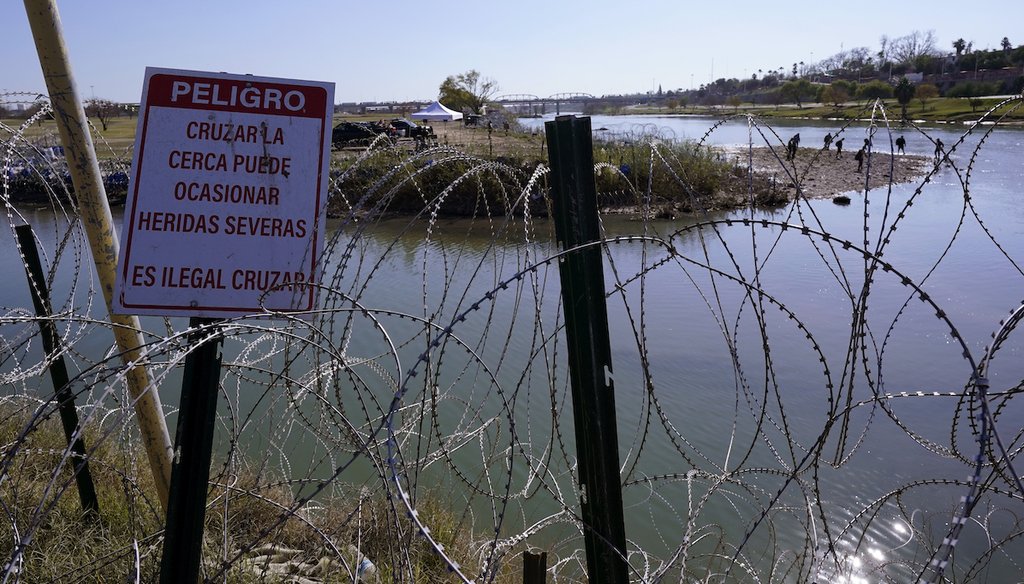Get PolitiFact in your inbox.

Migrants cross the Rio Grande into the U.S. from Mexico behind concertina wire and a sign warning that it's dangerous and illegal to cross on Jan. 3, 2024, in Eagle Pass, Texas. (AP)
If Your Time is short
-
Republican Texas Gov. Greg Abbott and the Biden administration are engaged in multiple legal battles over border security.
-
Texas put up miles of razor wire and blocked the U.S. Border Patrol from accessing Shelby Park near Eagle Pass, Texas, which the agency typically uses as a processing center for people who cross the U.S. southern border illegally.
-
Experts said Texas’ attempt to block the U.S. Border Patrol from accessing part of the border is “unprecedented.” But they also said federal-state disputes are not unprecedented and this conflict did not have the markings of a looming civil war, as some social media users predicted.
- Our mission: Help you be an informed participant in democracy. Learn more.
Texas and the federal government are fighting each other in court over who should take charge of an area in Texas that borders Mexico.
Republican Texas Gov. Greg Abbott argues that the Biden administration isn’t doing enough to control illegal border crossings. Abbott ordered the state’s National Guard to install razor wire along the Rio Grande near Eagle Pass, Texas. The goal: to block migrants’ path into the country.
But Biden administration officials and Department of Homeland Security court filings say Texas is denying U.S. Border Patrol agents’ ability to do their jobs. The wire blocks Border Patrol from entering Shelby Park, a state park that federal agents have used to process paperwork for migrants. People who reach the wire area are already on U.S. soil.
The battle has fueled social media posts that question whether a new civil war is underway.
Texas’ actions restricting Border Patrol’s movements are "quite unprecedented," said Stephen Vladeck, a University of Texas at Austin law professor.
"I’m not aware of, and Texas hasn’t identified, a prior case in which state authorities physically impeded the federal government’s access to an international border," Vladeck said.
Despite the legal and on-the-ground disagreements, however, the Civil War comparisons don’t fit well here, immigration and legal experts told us. The landscape of mid-1800s U.S. was vastly different, they said, and federal-state conflicts before and after the war — including over fugitive slaves, school integration and taxes — are not uncommon. Although Texas’ actions may be considered aggressive, none told us they expect the dispute to go beyond the courtroom.
Here’s what we know.
A young girl is lifted over concertina wire as migrants who crossed the Rio Grande and entered the U.S. from Mexico head to be processed by U.S. Customs and Border Protection on Sept. 23, 2023, in Eagle Pass, Texas. (AP)
The legal battle over razor wire and border control
Texas sued the Biden administration in October for cutting razor wire installed by the Texas National Guard along the Mexico border. Texas Attorney General Ken Paxton argued that the federal government "illegally destroyed" Texas property and "disrupted" Texas’ ability to stop illegal entries.
But the Biden administration says Border Patrol agents need access to an area cordoned off by Texas so that they can respond to medical emergencies involving migrants.
In January, after lower court appeals by both sides, the Biden administration asked the U.S. Supreme Court for an emergency decision. DHS said the Texas National Guard had added more razor wire along a 2.5-mile stretch of the U.S.-Mexico border and restricted Border Patrol’s ability to reach the Rio Grande and access to Shelby Park, an area agents use for migrant inspections.
On Jan. 22, the court sided with the Biden administration in a 5-4 decision, granting its request to allow it to remove the razor wire, at least while a lawsuit plays out in lower courts. Abbott after the decision said on X that he "will continue to defend Texas' constitutional authority to secure the border and prevent the Biden Admin from destroying our property."
CBS News reported that Texas National Guard members had begun adding additional razor wire the day after the Supreme Court decision.
The battle over the blocked-off area escalated after three migrants, two of them children, drowned Jan. 12 on the Rio Grande. Two other migrants who survived were in distress on the river but Border Patrol agents could not get to them because of the blocked access, the DHS said in a lawsuit over the razor wire. Texas responded that Border Patrol agents did not request access to the migrants.
This is not the first state-federal immigration tug-of-war
States and the federal government have previously disagreed over immigration enforcement. That’s the case with dozens of states, cities and counties across the U.S. that have enacted "sanctuary" policies limiting their cooperation with federal immigration authorities.
But "no sanctuary city has ever prevented federal immigration from coming into their territory in the same way that Texas is trying to do," said Huyen Pham, a Texas A&M law professor.
There’s a difference between local and state governments not cooperating with federal authorities and interfering with them, said Vladeck.
"Under the U.S. Constitution, local and state governments can choose whether to help the federal government enforce federal law," Vladeck said. "They can’t hinder the federal government from enforcing federal law."
Are Civil War comparisons apt?
A comparison between the Texas-Biden dispute and the Civil War is an imperfect one, as the relationship between the federal government and state troops is far more regulated now than it was in the 19th century, said Cecily Zander, a Texas Woman’s University assistant history professor.
"Biden has the option to supersede Gov. Abbott’s authority and federalize the Texas National Guard to compel them to move away from the border, since Texas remains in the Union," said Zander. That wasn’t an option for President Abraham Lincoln, Zander said, because Texas didn’t recognize the federal government’s authority in 1861, she said.
States have tried to block federal action many times, before and after the Civil War, said Lorien Foote, a Texas A&M University history professor. For example, states tried to tax the national bank out of existence and northern states used state officials to defy the federal fugitive slave laws, she said.
"The conflicts of Federalism are embedded in all parts of our history in the 19th and 20th centuries," Foote said.
Daniel Morales, a University of Houston Law Center associate professor of law, said he believes that the Texas and the Biden administration’s feud will be confined to the courtrooms, but made a Civil War analogy to describe Abbott’s actions in Texas.
The best analogy, "given the dueling military-adjacent operations, is the Battle of Fort Sumter, which started the Civil War. That’s how bellicose this action is by Governor Abbott," Morales said, referring to the 1861 battle in which Confederate forces attacked a South Carolina base occupied by Union forces.
Morales also compared Texas’ stance with Southern states’ resitance to integration, which resulted in federal troops integrating some schools at gunpoint.
"Abbott is using state-controlled troops to defy" federal law "in a way, that rhymes with both historical moments," Morales said.
Still, "the confrontation on the Texas border is nothing close to the sectional crisis, mass political conflict, and violence that led to the Civil War," said Michael Parrish, a Baylor University history professor emeritus.
What happens next?
Ultimately, the courts will decide whether Texas’ actions are legal and whether the federal government has superseding authority on immigration matters. The cases may ultimately end up back at the Supreme Court.
Pham said the current, more conservative Supreme Court might be open to some things Texas wants, such as arresting immigrants for state-based crimes, but not to blocking the Border Patrol from accessing the border.
That "seems like such a direct challenge to a really bedrock principle of immigration federalism that I think even this court would be reluctant to allow," Pham said.
Our Sources
Email interview, Stephen Vladeck, University of Texas at Austin law professor, Jan. 19, 2024
Phone interview, Huyen Pham, Texas A&M law professor, Jan. 19, 2024
Phone interview, Daniel Morales, University of Houston Law Center associate professor of law, Jan. 19, 2024
Steve Vladeck, Bonus 62: What the Heck is Happening Along the Rio Grande?, Jan. 18, 2024
Email interview, Cecily Zander, Texas Woman’s University assistant history professor, Jan. 22, 2024
Email interview, Lorien Foote, Texas A&M University history professor, Jan. 22, 2024
Email interview, Michael Parrish, Baylor University history professor emeritus, Jan. 22, 2024
Texas Attorney General Ken Paxton, CIVIL ACTION NO.2:23-CV-00055 , Oct. 24, 2023
Texas Attorney General Ken Paxton, Attorney General Ken Paxton Files Motion for Temporary Restraining Order After Biden Administration Escalates Border Barrier Destruction, Oct. 27, 2023
Texas Attorney General Ken Paxton, Civil Action No. DR-23-CV-00055-AM, Oct. 30, 2023
CNN, Texas AG sues Biden administration for cutting razor wire at the US-Mexico border, Oct. 24, 2023
The Wall Street Journal, Texas spent billions on border security. It’s not working, July 21, 2023
The Texas Tribune, Migrants arrested by Texas in border crackdown are being imprisoned for weeks without legal help or formal charges, Sept. 27, 2021
The Texas Tribune, Federal judge orders immigration agents to stop removing Texas’ concertina wire on the border, Oct. 30, 2023
The Associated Press, Justice Department sues Texas over law that would let police arrest migrants who enter U.S. illegally, Jan. 3, 2024
Texas Gov. Greg Abbott’s office, Operation Lonestar, accessed Jan. 19, 2024
Texas Attorney General Ken Paxton, Civil Action No. DR-23-CV-00055-AM, Nov. 29, 2023
The Texas Tribune, Judge denies Texas’ request to stop feds from cutting border razor wire, Nov. 30, 2023
Texas Attorney General Ken Paxton, Case: 23-50869, Dec. 19, 2023
Reuters, Court blocks US government destruction of Texas border razor wire fencing, Dec. 19, 2023
Reuters, White House turns to US Supreme Court in Texas razor-wire border dispute, Jan. 2, 2024
U.S. Supreme Court, Department of Homeland Security, et al., applicants v. State of Texas, Nov. 29, 2023
U.S. Supreme Court, Department of Homeland Security, et al., applicants v. State of Texas, Jan. 12, 2024
U.S. Department of Justice, Case No. 1:24-cv-00008, Jan. 3, 2024
CNN, What we know about the drownings of 3 Mexican migrants near Eagle Pass, Texas, Jan. 16, 2024
U.S. Supreme Court, Department of Homeland Security, et al., applicants v. State of Texas, Jan. 15, 2024
U.S. Supreme Court, Department of Homeland Security, et al., applicants v. State of Texas, Jan. 17, 2024
NBC News, Letter to K. Paxton from J. Meyer, Jan. 14, 2024
Texas Attorney General Ken Paxton, Letter to Jonathan E. Meyer, general counsel U.S. Department of Homeland Security, Jan. 17, 2024
Texas Attorney General Ken Paxton, Attorney General Ken Paxton responds to Biden administration’s demand that Texas "cease and desist" securing its border, Jan. 17, 2024

































